Review: OPTIMIST at Chateau Neuf - Jumps for Joy, but Struggles a Bit to Find Its Footing
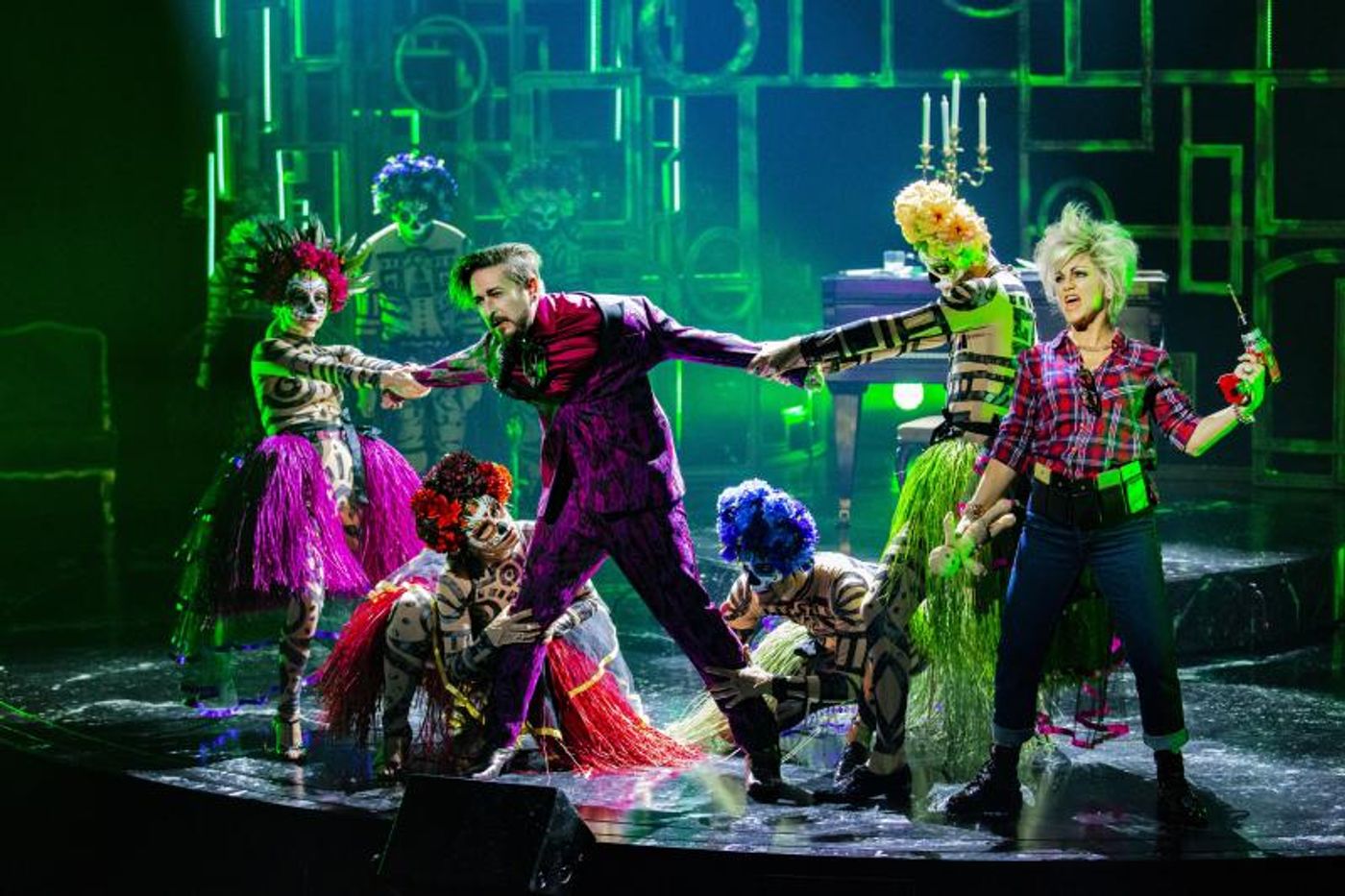
 On September 27th legendary songwriter and performer, Jahn Teigen, will turn Seventy. To international readers he may be best known for his contributions to Eurovision song contest, and his role as the executioner in the West End musical "Which Witch," that is still a hot topic among the musical theater community. But the true power of Jahn Teigen's legacy lays in his songs, which is a huge part of Norwegian culture. They have formed a common bond that, in spite of social background or upbringing, has stood the test of time. Songs that most of us (Norwegians) know by heart. Hits such as are performed everywhere - from get-togethers, nightclubs to weddings and funerals. A selection are now the basis for a new musical appropriately named "Optimist". I am in awe by the producers and creative team, especially book writer Øystein Wiik, for having the guts to adapt Teigen's songs into a full-fledged musical comedy.
On September 27th legendary songwriter and performer, Jahn Teigen, will turn Seventy. To international readers he may be best known for his contributions to Eurovision song contest, and his role as the executioner in the West End musical "Which Witch," that is still a hot topic among the musical theater community. But the true power of Jahn Teigen's legacy lays in his songs, which is a huge part of Norwegian culture. They have formed a common bond that, in spite of social background or upbringing, has stood the test of time. Songs that most of us (Norwegians) know by heart. Hits such as are performed everywhere - from get-togethers, nightclubs to weddings and funerals. A selection are now the basis for a new musical appropriately named "Optimist". I am in awe by the producers and creative team, especially book writer Øystein Wiik, for having the guts to adapt Teigen's songs into a full-fledged musical comedy.
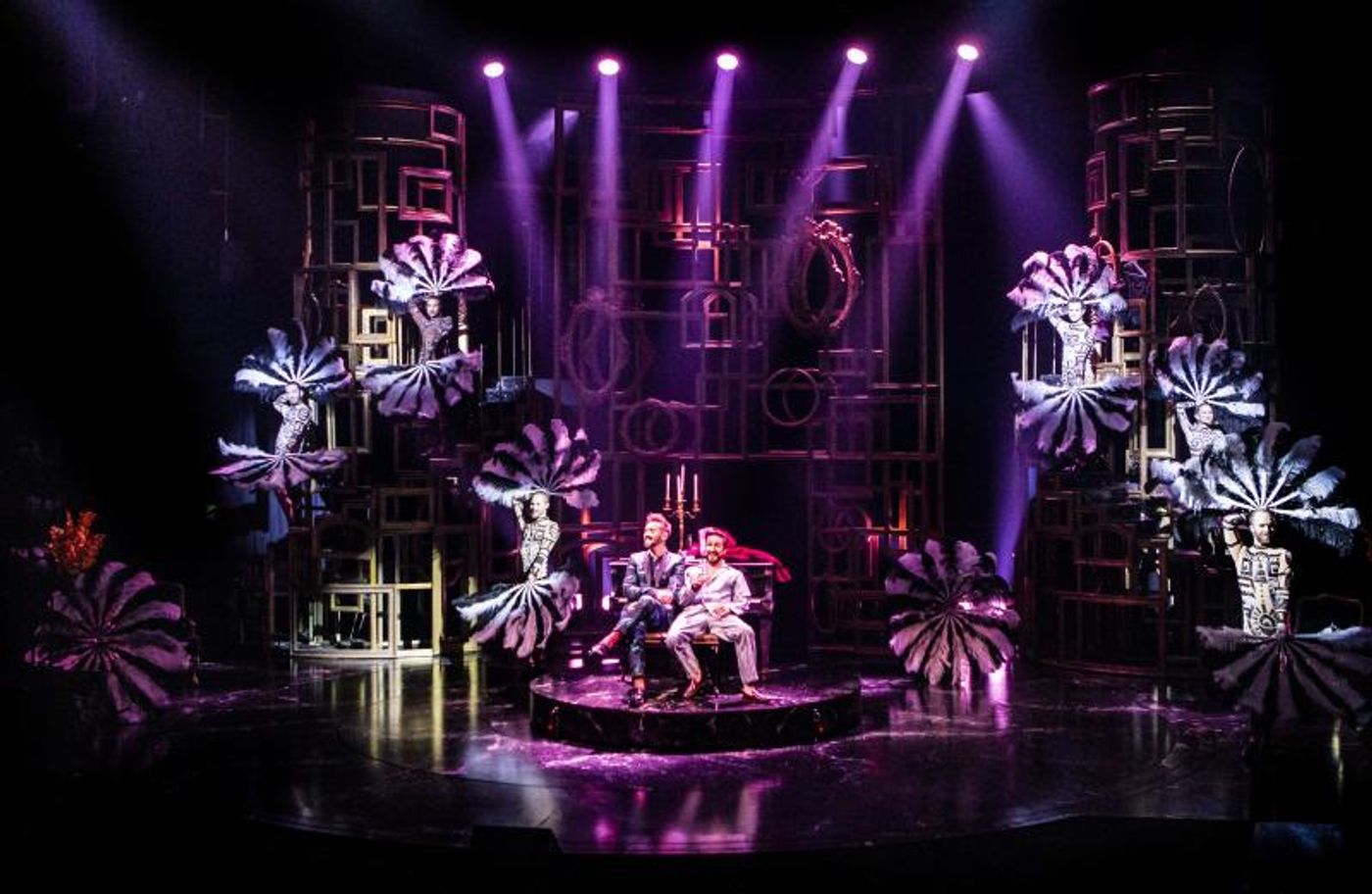
This musical is indeed a outlandish comedy, with a larger than life bisexual composer suitably named Viktor Sibelius, who suffers from writers block ever since his mother died. He needs to finish his latest musical within the next 72 hours or there will be no opening night. Hedvig Hjorth, his loud mouthed manager , locks him up in her mansion, to make sure he finishes the score in time, while simultaneously holding off the anxious production team and angry creditors. His overly loyal companion/butler Kaj is there to inspire and nurture him back into shape. We are also introduced to Kjell, a rather eccentric electrician who has been sent to fix the wiring, while secretly dreaming of being a musical performer in Sibelius' next musical. Later on a girl, named Sarah, mysteriously appears to interview Sibelius for her master degree, but who is overly interested in his past relations with her mother. Is she the inspiration he needs to finish his work?
 While the songs are the strongest asset in this kind of musical, they can also become its biggest obstacle, because they have a tendency stall the plot instead of driving the story forward. This is a common problem for "Jukebox Musicals" where the preexisting songs form the basis for the overall structure, and not the other way around which is usually how it works. It's a tricky thing to get right, without sacrificing a certain amount of the songs structure and meaning. It would have served the plot better if the author had been less afraid to alter more of the lyrics to serve the plot, and move the story along.
While the songs are the strongest asset in this kind of musical, they can also become its biggest obstacle, because they have a tendency stall the plot instead of driving the story forward. This is a common problem for "Jukebox Musicals" where the preexisting songs form the basis for the overall structure, and not the other way around which is usually how it works. It's a tricky thing to get right, without sacrificing a certain amount of the songs structure and meaning. It would have served the plot better if the author had been less afraid to alter more of the lyrics to serve the plot, and move the story along.
The musical has a lot of situations going on at the same time, but there is little progression in the plot during the first act. Lots of repetitions involving the composer trying to write his music, and those around him encouraging to do so. Of course, there are plenty of humorous bits along the way, but a lot of them do not manage to hit the mark, mostly because the characters are portrayed like caricatures rather than characters with more depth. Lots of overacting, which I'm sure is intended, but it makes the comedy and situations feel more forced. A lot of the cleverly written funny dialogue would land better if they didn't play for laughs as much.
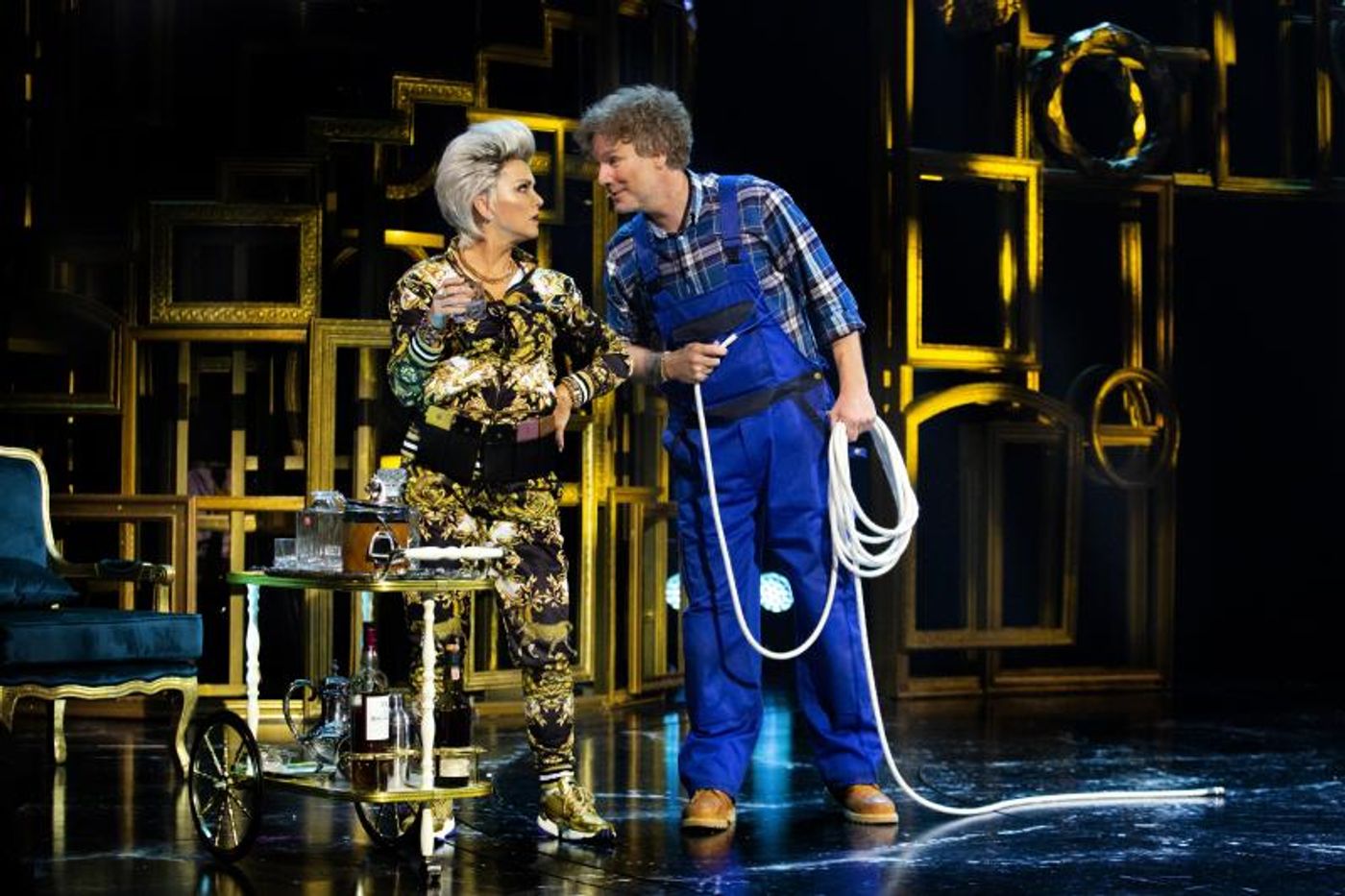
The musical has engulfed a wide variety both comical and dramatic styles and switches constantly from one to the other. As a result it struggles a bit to find its footing, and makes it harder to keep the focus. The second act is far more cohesive, and includes several beautiful moments where the music and lyrics compliment the plot, and the musical has more drive as a result of this. Especially the last final third of the musical works well. Everything feels more in place.
.jpg?format=auto&width=1400) Hans Marius Hoff Mittet's Viktor Sibelius is portrayed overly dramatic, and it borders to parodic especially during the first act. His singing talent is unquestionable, and he delivers Jahn Teigen's more serious songs very well. The character is written to be very self-absorbed, but directorially I miss a more natural delivery of his lines, in order for him to be relatable which would make me feel more sympathy for the character. The same can be said for Jan Martin Johnson's butler Kaj. I would have enjoyed to see a less caricatured portrayal of the "stereotypical" gay butler. I am not saying that he shouldn't be flamboyant, just toned down a few notches in order make the comedy flow more naturally. This would also make the somber scenes between him and
Hans Marius Hoff Mittet's Viktor Sibelius is portrayed overly dramatic, and it borders to parodic especially during the first act. His singing talent is unquestionable, and he delivers Jahn Teigen's more serious songs very well. The character is written to be very self-absorbed, but directorially I miss a more natural delivery of his lines, in order for him to be relatable which would make me feel more sympathy for the character. The same can be said for Jan Martin Johnson's butler Kaj. I would have enjoyed to see a less caricatured portrayal of the "stereotypical" gay butler. I am not saying that he shouldn't be flamboyant, just toned down a few notches in order make the comedy flow more naturally. This would also make the somber scenes between him and 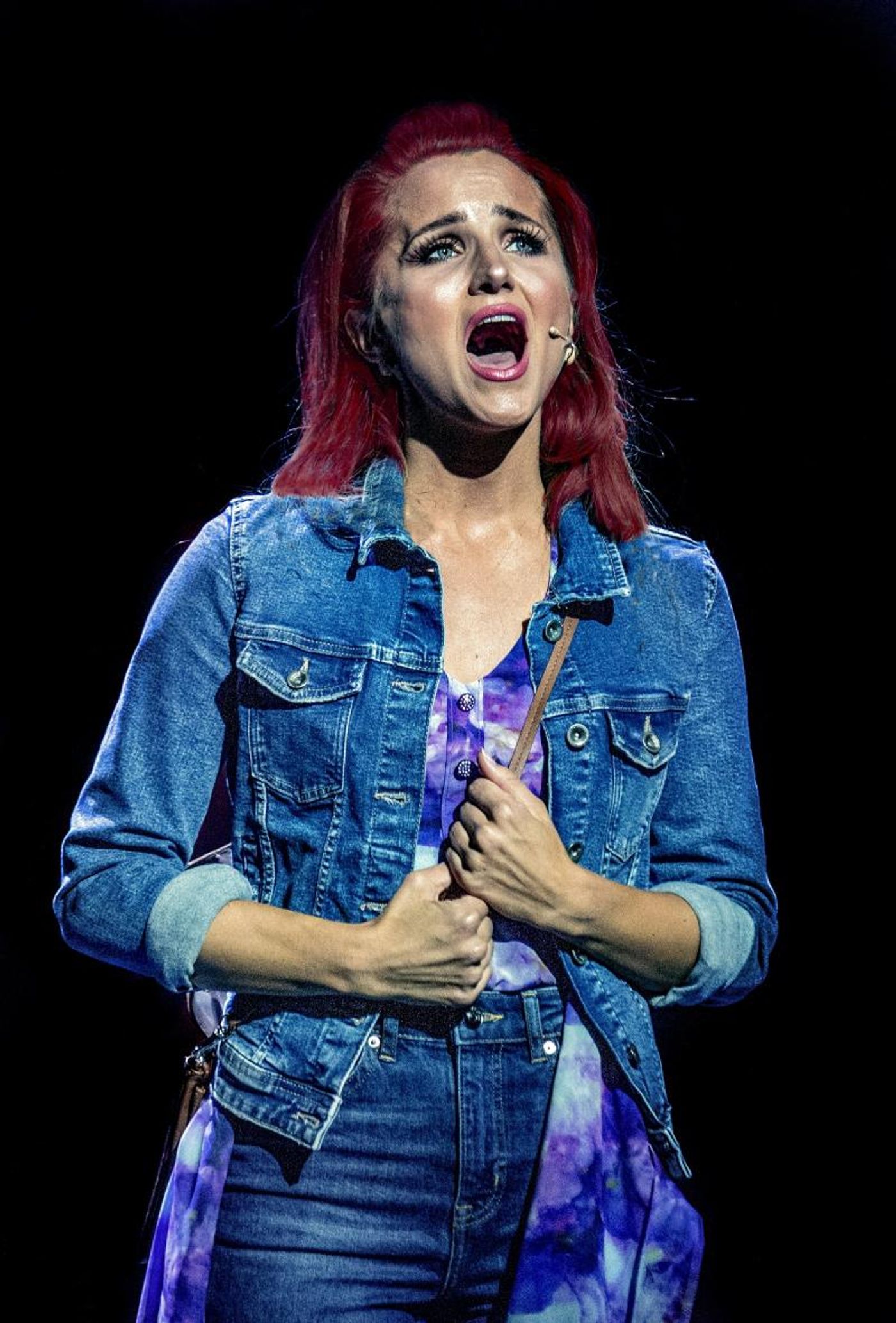 Mittet in act two appear more powerful. Charlotte Brænna has a rather expository character, and drives the plot forward. She delivers with good diction and purpose. Her rendition of "Det vakreste som fins" is beautiful. Hilde Lyrån's first number "Det er en fin dag" established her as force to be reckoned with, and she sure made an impression as the bossy manager Hedvig Hjorth. The constant aggravation over Viktor not finishing the score became a bit repetitive after a while, though. She had good interaction with Kjell played by Gustav Nilsen, who is this productions talisman for the more traditional, old fashioned, comedy which he does very well. Also I was truly impressed by his dancing during the finale. I was not overly impressed by Jonas Rønning as the mobster "Gønnar" though, a character that felt rather redundant to the musical's plot.
Mittet in act two appear more powerful. Charlotte Brænna has a rather expository character, and drives the plot forward. She delivers with good diction and purpose. Her rendition of "Det vakreste som fins" is beautiful. Hilde Lyrån's first number "Det er en fin dag" established her as force to be reckoned with, and she sure made an impression as the bossy manager Hedvig Hjorth. The constant aggravation over Viktor not finishing the score became a bit repetitive after a while, though. She had good interaction with Kjell played by Gustav Nilsen, who is this productions talisman for the more traditional, old fashioned, comedy which he does very well. Also I was truly impressed by his dancing during the finale. I was not overly impressed by Jonas Rønning as the mobster "Gønnar" though, a character that felt rather redundant to the musical's plot.
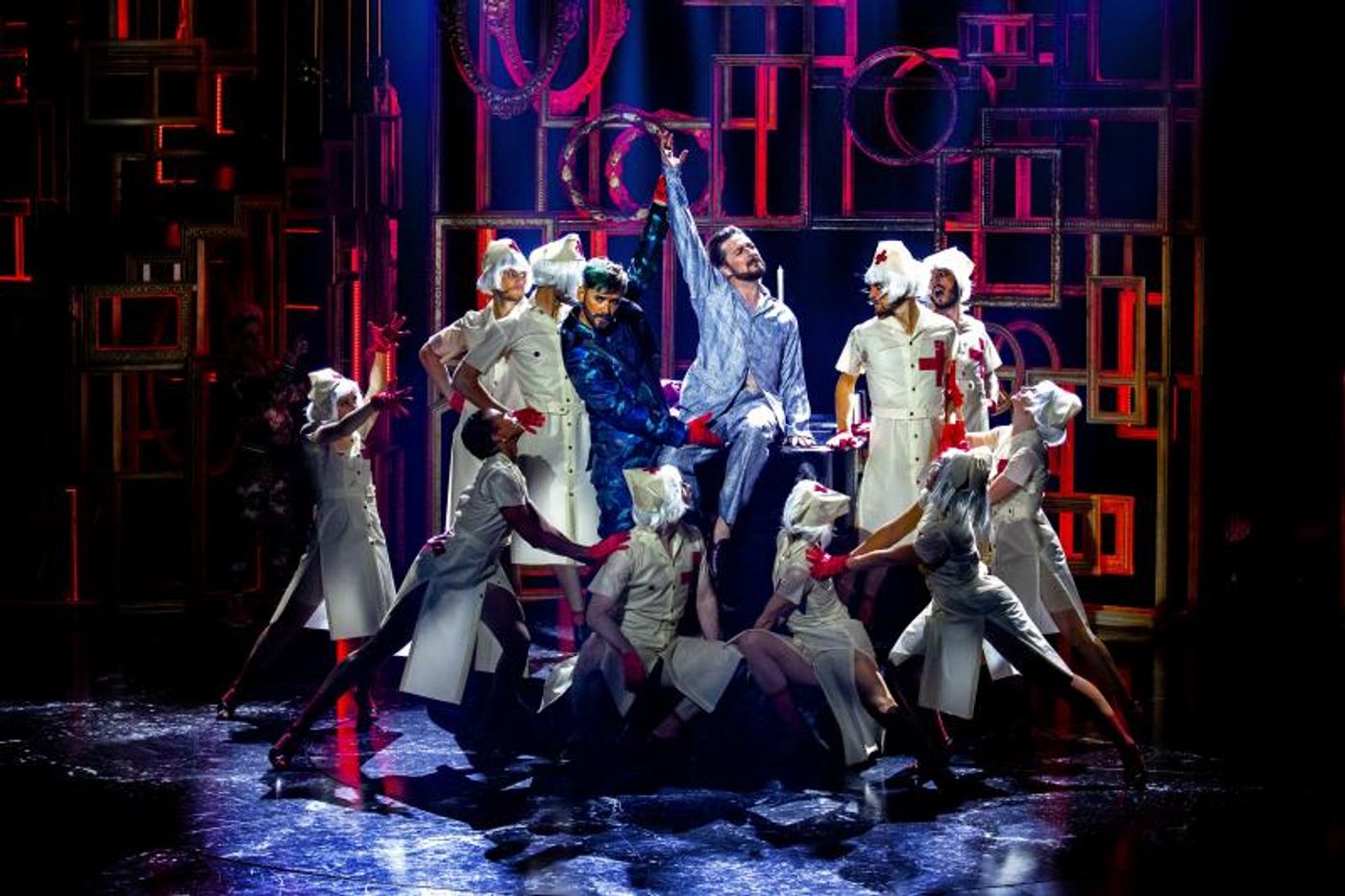
Director Mattias Carlsson has gone for an "over the top style" of acting in this musical, and as stated earlier I felt it wasn't well suited for this type of material. The libretto in itself is so over the top in nature that more realness in the acting would make the comedy fare a lot better. That said his staging is tight and to the point. The ensemble is does a fine job, but underused. The choreography by Simen Gloppen works well during the opening, "Do-Re-Mi" and finale, but the in other parts it was a bit cluttered, much due to the revolving scenery and the huge podium on stage. Musical supervisor Hans Einar Apelland has arranged the music in a manner that fits in nicely with the style of Jahn Teigen's songs. I would have liked to hear more intricate vocal arrangements on several of the songs. Numbers like "Do-Re-Mi" felt a bit underwhelming, when sung an octave below Teigen's signature high belt, so to add some harmonies would make that song, and several others, sound richer and more exciting. The revolving scenery is circular abstract looking. It moves fluently, and a very nice extra touch to have it move in multiple directions. The abstract patterns from the scenery is also displayed in the costumes. Like the show itself the costumes are over the top with everything from birdcage-hats to voodoo attires.
It is a risky move to produce a fully original musical on a Norwegian stage, and anyone who dares to take on such a venture deserves praise. While the end result was mixed, you cannot help but feel happy (even optimistic) when witnessing Teigen's music performed live on stage by very talented performers.
Reader Reviews
Videos


